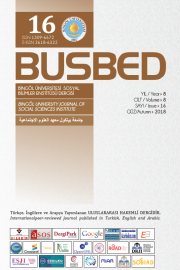TÜRKİYE’DE GELİR EŞİTSİZLİĞİNİN MALİYE POLİTİKASI ARAÇLARI VE KURUMSAL
FAKTÖRLER AÇISINDAN ANALİZİ VE ÇÖZÜM ÖNERİLERİ
ANALYSIS OF INCOME INEQUALITY IN TERMS OF FISCAL POLICY INSTRUMENTS AND INSTITUTIONAL QUALITY FACTORS IN TURKEY AND SUGGESTED SOLUTIONS
Author(s): Kübra SAYANER, Erdoğan TEYYARESubject(s): National Economy, Economic policy, Evaluation research, Fiscal Politics / Budgeting
Published by: Bingöl Üniversitesi Sosyal Bilimler Enstitüsü
Keywords: Income Inequality; Fiscal Policy; Institutional Quality; Least Squares Method; Gini Coefficient;
Summary/Abstract: The income inequality that occurs when the economic units take their margins different from each other is an important component, which constitutes the basic economic aim and policies of all countries regardless of their level of development. Income inequality is an important issue that needs to be addressed as it brings along social and economic problems. States develop various policies to solve this problem, and at the top of them are fiscal policy implementations. The public sector is trying to provide justice in the distribution of income by ensuring redistribution of income with taxes, which is one of the fiscal policy instruments and public expenditures. In addition to being influenced by various factors in the emergence of income inequality in a country, the institutional structure of the country also has great precaution. In the light of this view, it is expected that income inequality shall be lower in countries whose institutional structure is strong; in other words, institutional quality level is high.
Journal: Bingöl Üniversitesi Sosyal Bilimler Enstitüsü Dergisi (BUSBED)
- Issue Year: 8/2018
- Issue No: 16
- Page Range: 309-334
- Page Count: 26
- Language: Turkish

